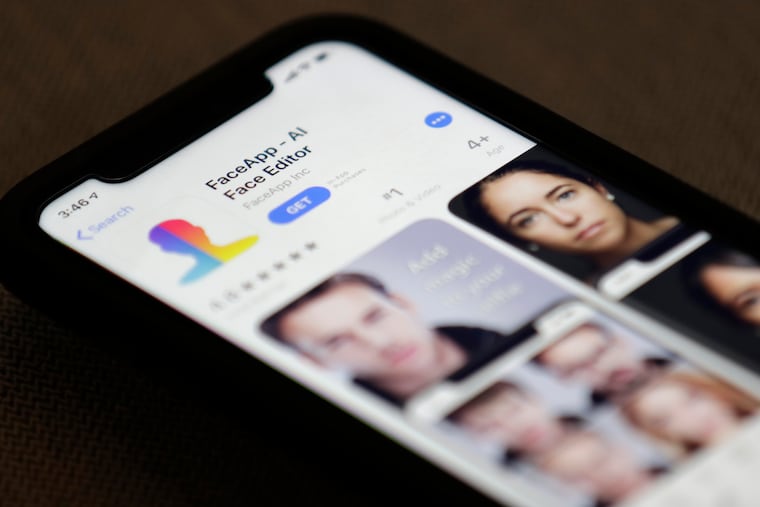Is FaceApp safe? Pause before downloading and use caution, experts say.
A viral trend taking over your social media platforms is making your friends and family much older — and hopefully its surrounding controversy will make users a little wiser, too.

A viral trend taking over your social media platforms is making your friends and family much older — and the surrounding controversy may make users a little wiser, too.
FaceApp, a Russia-based company that faced criticism in 2017 for its “ethnicity” filters, is again gaining widespread attention thanks to a feature that artificially ages self-uploaded photos.
The resurgence in popularity — FaceApp is the No. 1 free app in the App Store and Google Play — doesn’t come without renewed rancor. In a post-Cambridge Analytica world, where many vowed to delete Facebook accounts while concern mounted over facial recognition, users, critics, and now lawmakers are questioning FaceApp’s safety.
For Jessa Lingel, an assistant professor of communication at the University of Pennsylvania, the craze is an all-too-recognizable pattern.
“It’s always the same model of bringing people on board because it is fun and people are curious, and that’s normal, but it’s this very familiar trade-off of convenience and entertainment, and then what you get in return is increased surveillance, so I was immediately concerned because the surveillance capacity is so clear," she said.
How it works
FaceApp uses artificial technology for its various filters, allowing users to change their facial expressions or hairstyles, as well as to look older or younger. While many were quick to jump on the #FaceAppChallenge on social media, questions about what the start-up owned by Wireless Lab is doing with the data have swelled.
While the app doesn’t upload users’ entire camera roll, its terms of use say it may store and “publicly perform and display your User Content and any name, username or likeness provided in connection with your User Content in all media formats and channels now known or later developed, without compensation to you.”
Additionally, “you consent to the processing, transfer and storage of information about you in and to the United States and other countries, where you may not have the same rights and protections as you do under local law.”
FaceApp CEO Yaroslav Goncharov, however, told the Washington Post that the app holds “most” photos on its servers for 48 hours and is not using your images for facial recognition, nor is it handing over photos to the Russian government. While its research-and-development team is based in Russia, the data aren’t transferred to that country, the app told TechCrunch. FaceApp did not respond to a request for comment.
Experts still advise to proceed with caution, and not just with FaceApp.
The controversy
Senate Minority Leader Chuck Schumer has called for a federal probe into the app, warning it could pose security and privacy risks.
“In the age of facial recognition technology as both a surveillance and security use, it is essential that users have the information they need to ensure their personal and biometric data remains secure, including from hostile foreign nations,” Schumer wrote in a letter to the FBI and Federal Trade Commission requesting an investigation.
The Democratic National Committee advised 2020 presidential campaigns against using the app, CNN reported.
Experts caution to think twice before uploading their visage. Both Lingel and Robert D’Ovidio, an associate professor of criminology and justice studies at Drexel University who focuses on the intersection of crime and computer technology as well as electronic surveillance, said questions remain.
They both raised issues over facial recognition, access to photo metadata, and a lack of means to adjudicate bad behavior. D’Ovidio, who called the choice to download the app a “personal decision” — and said he won’t do so himself — raised concern with the company’s location; not Russia specifically, but a country where there aren’t as many assurances for protection.
“You’re not going to get that same sort of regulatory oversight and the enforcement mechanism when you deal with companies that reside outside the United States,” he said.
The experts said lawmakers’ interest in protecting users’ data was a step forward, but there’s more to learn. FaceApp’s latest controversy "should be an eye-opening experience,” D’Ovidio said.
Consumers must take steps to educate themselves, they said, but there’s blame to be shared.
“Social media companies have conditioned us not to read the terms and conditions,” Lingel said. “There’s no legal reason that those documents can’t be more legible and can’t be more accessible and can’t be more bottom-up and top-down, but instead they’re written by lawyers for lawyers.”
What you can do
Users can request to have their data deleted, the company told the Post and TechCrunch.
On the app, users should head to “Settings-Support-Report a bug” and include “privacy” in the subject line. The company is working on a better user interface for the process, it told TechCrunch.